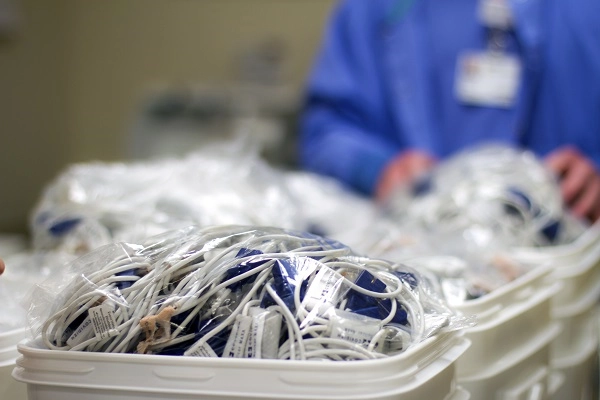How can we make your day better?
Recycling program keeps medical supplies out of landfills

Before 2014, Salem Health dumped thousands of tons of used medical supplies in the trash each year, which found its way to landfills and the incinerator in Brooks.
Every hospital faces regulations and expiration dates forcing that practice, so Salem Health wasn’t alone.
But in 2014 we joined the re-process and re-use movement — and have already made a huge dent in that landscape. We contract with re-processing companies, and donate unused supplies and obsolete equipment to Medical Teams International for their missions to developing countries.
Some recycling began even earlier, with used catheters going to Sterilmed Solutions, keeping several hundred catheters out of landfills every year since 2011.
Saving and re-using
Salem Health diverts about 5,690 pounds a year from landfills through ReNu Medical, which reprocesses the equipment. ReNu takes our used blood pressure cuffs, HoverMatts (used for patient transport), and compression sleeves.
“We’ve not only reduced landfill waste by 17,000 pounds, but also saved more than $217,000 since 2014 by buying back good-as-new products at less cost,” said Kathy Martin, supply chain services manager.
Salem health also re-processes finger sensors (for taking pulses) through Medtronic/Covidien. “We’ve collected nearly 6,000 pounds since 2014 that would normally be tossed,” Martin added. “Buying back the re-processed ones at less cost has saved more than $400,000 since 2014.”
Checking inventory constantly
The hospital’s sterile processing department tracks opened but unused items closely, sending them along with expired supplies to medical charities with less strict standards.
An automatic inventory system flags items nearing expiration to use first. In some cases, items are switched out by the vendor for new products to keep inventory fresh. Five supply coordinators also routinely remove expired products, often to donate to charities.
- Hospital news
- Our community
- article

Recycling program keeps medical supplies out of landfills


Before 2014, Salem Health dumped thousands of tons of used medical supplies in the trash each year, which found its way to landfills and the incinerator in Brooks.
Every hospital faces regulations and expiration dates forcing that practice, so Salem Health wasn’t alone.
But in 2014 we joined the re-process and re-use movement — and have already made a huge dent in that landscape. We contract with re-processing companies, and donate unused supplies and obsolete equipment to Medical Teams International for their missions to developing countries.
Some recycling began even earlier, with used catheters going to Sterilmed Solutions, keeping several hundred catheters out of landfills every year since 2011.
Saving and re-using
Salem Health diverts about 5,690 pounds a year from landfills through ReNu Medical, which reprocesses the equipment. ReNu takes our used blood pressure cuffs, HoverMatts (used for patient transport), and compression sleeves.
“We’ve not only reduced landfill waste by 17,000 pounds, but also saved more than $217,000 since 2014 by buying back good-as-new products at less cost,” said Kathy Martin, supply chain services manager.
Salem health also re-processes finger sensors (for taking pulses) through Medtronic/Covidien. “We’ve collected nearly 6,000 pounds since 2014 that would normally be tossed,” Martin added. “Buying back the re-processed ones at less cost has saved more than $400,000 since 2014.”
Checking inventory constantly
The hospital’s sterile processing department tracks opened but unused items closely, sending them along with expired supplies to medical charities with less strict standards.
An automatic inventory system flags items nearing expiration to use first. In some cases, items are switched out by the vendor for new products to keep inventory fresh. Five supply coordinators also routinely remove expired products, often to donate to charities.


Leave a commentOrder by
Newest on top Oldest on top